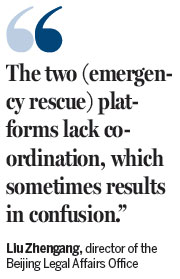

Drivers of private cars in Beijing will face penalties if they do not pull aside to make a path for ambulances, the city's top legislature said on Friday in a draft regulation dealing with emergency services.
The draft, which was submitted to the Standing Committee of the Beijing People's Congress for discussion, also covers emergency first aid for injured people before professional help arrives.
It was the first time that proposals for first aid education were included in legislation.
Penalties for drivers who do not make way for ambulances were not outlined in the draft, but were to include fines.
The draft aims to streamline the capital's emergency medical treatment system, which has some bottlenecks, and provide more information to the public about emergencies, Liu Zhengang, director of the Beijing Legal Affairs Office, said on Friday.
As the average age of residents in the city climbs, the demand for emergency medical care has also increased, "raising the requirements for our first aid services", Liu said.
Demand for first aid has risen about 6.5 percent annually since 2010. In 2014, the number of emergency calls across the city reached 726,000, according to the government.

Beijing residents can request first aid by dialing 120, which connects them to the Beijing Emergency Medical Center, and 999 to reach the Beijing Red Cross Emergency Rescue Center.
"But the two platforms lack coordination, which sometimes results in confusion," Liu said.
The emergency response system needs to be regulated, while the rights and duties of the centers' staff should be also clarified, he said, noting that is why the draft was developed.
The draft proposes building a command post to coordinate the two centers, ensuring that each has a 24-hour hotline and can contact hospitals nearest its rescue station at the fastest possible speed, he said.
Meanwhile, medical workers from the centers have been asked to communicate with hospital emergency departments when they pick up patients, ensuring that connections go smoothly.
In developed countries, more than 50 percent of residents know how to give emergency medical treatment, but in Beijing, the figure is less than 40 percent, said Sun Shichao, director of the key committee under the legislature dealing with the issue.
"So providing more first aid knowledge to more people is necessary," Sun said.
Zhang Xiufang, the committee's deputy director, said training will be provided to police officers, firefighters, teachers, tour guides and bus ticket conductors first, as stated in the draft.
caoyin@chinadaily.com.cn